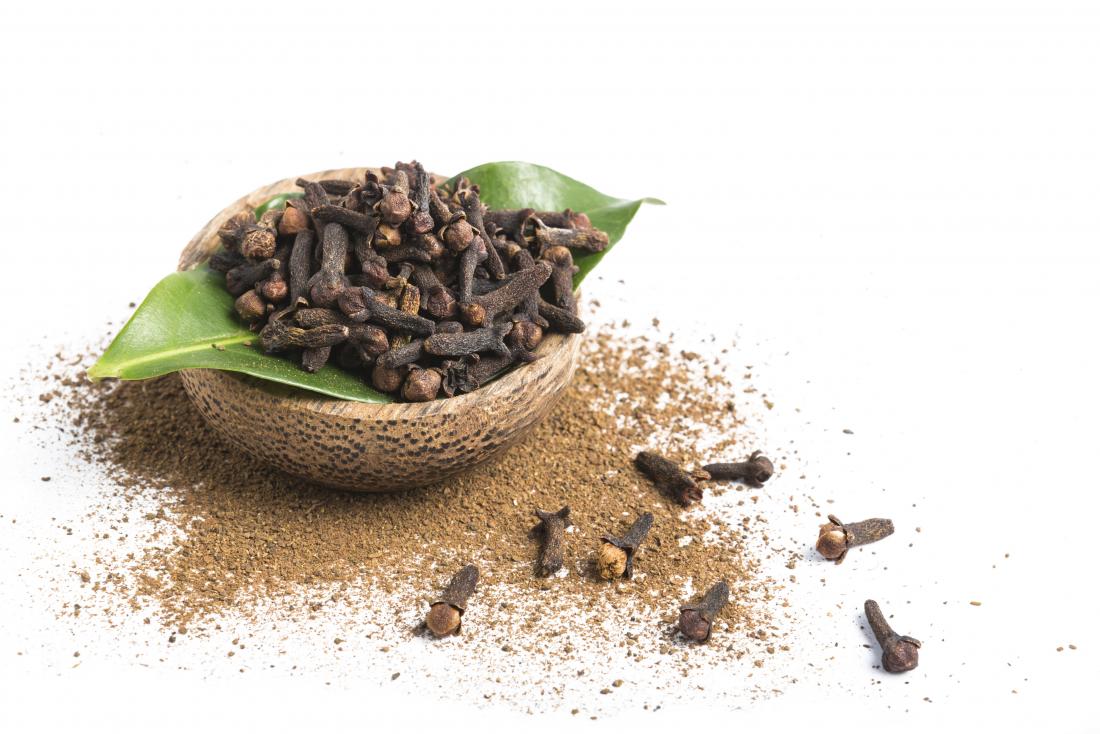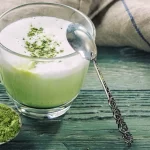Benefits of Cloves Tea to the Body
Health benefits of cloves tea include protection against infection, blood sugar regulation, better oral health, and other benefits. Cloves are small, nail-shaped dried flower buds that come from an evergreen tree native to Indonesia and India.
The name “cloves” is derived from the Latin word “clavus,” meaning “nail,” because of their resemblance to tiny nails. These aromatic and flavorful buds are widely used as a spice to enhance the taste and aroma of a variety of foods and drinks.
You might have experienced their warm, spicy flavor in dishes like honey-glazed ham, apple pie, or festive drinks like mulled wine.
Cloves are a rich source of dietary fiber, essential minerals such as manganese and potassium, and nutrients like vitamin K. They also contain powerful organic compounds, including flavonoids, beta carotene, thymol, eugenol, benzene, and other beneficial elements.
The nutrients and organic compounds found in cloves are known for their medicinal properties. In traditional Chinese medicine, cloves have long been used to support digestion and address various health concerns.
Modern scientific studies have confirmed that cloves contain compounds with pain-relieving (analgesic), anti-inflammatory, and antimicrobial properties, which can contribute to overall health and well-being.
Adding cloves to your meals or drinks can provide several health benefits, many of which you may not be aware of. Including this versatile spice in your diet can improve your health in surprising and impactful ways.

Nutritional Values
Cloves are rich in the following nutrients:
- Dietary Fiber
- Vitamin K
- Vitamin C
- Manganese
- Potassium
- Calcium
- Magnesium
- Iron
- Beta Carotene
- Eugenol (a powerful antioxidant)
- Flavonoids
- Thymol
- Benzene derivatives
- Omega-3 fatty acids
These nutrients contribute to the numerous health benefits associated with consuming cloves.
Here is a table showing the key nutrients in cloves and their approximate percentage of the daily recommended intake (based on a 2-gram serving, roughly 1 teaspoon of ground cloves):
| Nutrient | Amount per 2g | % Daily Value (DV) |
| Dietary Fiber | 1.1 g | 4% |
| Vitamin K | 2.4 µg | 3% |
| Vitamin C | 1.6 mg | 2% |
| Manganese | 1.26 mg | 63% |
| Potassium | 20 mg | <1% |
| Calcium | 18 mg | 2% |
| Magnesium | 5 mg | 1% |
| Iron | 0.3 mg | 2% |
| Beta Carotene | Trace amounts | Not established |
| Eugenol | Present | Not established |
| Flavonoids | Present | Not established |
| Thymol | Present | Not established |
| Omega-3 Fatty Acids | Trace amounts | Not established |
Notes:
- Percent Daily Values (% DV) are based on general guidelines and may vary by individual nutritional needs.
- “Not established” indicates that specific daily values for these compounds (like eugenol or flavonoids) have not been determined.
- Cloves are particularly rich in manganese, offering a significant portion of the daily requirement in just a small serving.
Health Benefits of Cloves Tea to the Body
Cloves Protect Against Infections
- Cloves contain eugenol, a powerful active compound found in clove oil, known for its antiseptic, antibacterial, and antifungal These attributes make cloves an effective natural remedy for protecting the body against infections caused by various microorganisms.
- Preliminary research suggests that clove oil may help combat harmful pathogens. For example, a study published in the Journal of Applied Microbiology found that eugenol exhibited strong antimicrobial effects against several strains of pathogenic bacteria, including Escherichia coli (E. coli), a bacterium associated with foodborne illnesses. The study highlights cloves’ potential as a natural preservative or a complementary antimicrobial treatment. (Source: PubMed).
- Additionally, animal studies provide early evidence of the immune-boosting potential of clove oil. Research conducted on mice indicated that clove essential oil might stimulate the production of white blood cells, which play a critical role in defending the body against infections. This suggests that regular consumption of cloves could enhance immune system performance, though more human-focused studies are needed to confirm these benefits (Source: Study Link).
- Cloves Help Regulate Blood Sugar
- Cloves may support blood sugar management, making them particularly beneficial for individuals with type 2 diabetes or those at risk of developing the condition. Clove extract has been shown to mimic the effects of insulin, the hormone responsible for regulating blood sugar levels. This insulin-like activity can help maintain stable glucose levels in the body.
- In a clinical trial, participants with type 2 diabetes consumed 1 to 3 grams of cloves daily over a one-month period. The results revealed significant improvements in blood sugar control, as well as reductions in triglycerides and cholesterol levels (Source: Diabetes Care Journal). These findings underscore the potential role of cloves as a dietary supplement for diabetes management.
- Moreover, cloves are a rich source of manganese, a mineral associated with improved blood sugar metabolism. Adequate manganese levels have been linked to better regulation of glucose and insulin, further supporting the notion that cloves could help prevent or manage diabetes. (Source: Healthline).
While research into the benefits of cloves is ongoing, current evidence points to their promising role in fighting infections and regulating blood sugar. Adding cloves to your diet—whether as a spice or in extract form—can complement a balanced approach to health. However, consult with a healthcare professional before using cloves as a treatment for specific conditions.
Cloves Help with Oral Care
Cloves have long been valued for their antimicrobial properties, making them highly effective in promoting oral health. The use of eugenol, a primary compound in clove oil, for treating dental issues such as toothache, jaw pain, and sore gums, dates back to the 13th century. Eugenol continues to be used in modern dentistry due to its antibacterial, pain-relieving, and anesthetic effects.
Eugenol’s ability to combat oral bacteria has made it a common ingredient in herbal toothpastes and mouthwashes. For instance, a study published in the Journal of Indian Society of Periodontology found that using a mouthwash containing clove extract for 21 days significantly improved gum health and reduced bacterial buildup in the mouth. This research underscores the potential of cloves in preventing gum disease and maintaining oral hygiene (Source: Journal Link).
Although rare, some individuals may experience contact dermatitis from eugenol, so it is essential to consult a healthcare professional if irritation occurs.
Cloves Suppress Cough
Clove oil is also beneficial for respiratory health, particularly in managing coughs. It acts as an expectorant, helping to loosen mucus and clear the respiratory tract. Brewing crushed cloves in tea can provide relief from upper respiratory ailments, including persistent coughs.
The anti-inflammatory properties of cloves soothe throat irritation, while their antibacterial and antifungal effects help address the underlying causes of coughs, such as infections. This makes cloves a natural and effective remedy for respiratory discomfort.
Cloves offer significant benefits for both oral care and respiratory health. Their antimicrobial and anesthetic properties make them ideal for promoting gum health and addressing dental issues, while their expectorant and anti-inflammatory effects provide relief from coughs and other respiratory ailments.
Adding cloves to your routine—whether as an ingredient in mouthwash, toothpaste, or tea—can naturally enhance your health. However, always consult a healthcare professional for guidance, particularly if you experience any adverse reactions.
Cloves Promote Gut Health
Cloves are beneficial for digestive health, thanks to their fiber content and powerful antioxidant properties. The fiber in cloves supports regular bowel movements and overall digestive health, while the antioxidants help reduce inflammation in the gastrointestinal tract.
Cloves are particularly effective in relieving indigestion and bloating, as well as reducing gas. The compound eugenol, found in cloves, has shown promise in alleviating the pain and discomfort caused by peptic ulcers, which occur when the stomach’s protective mucus lining becomes thin or damaged.
Research has also indicated that clove extract may enhance mucus production in the stomach lining. This increased mucus layer can act as a barrier, protecting the stomach lining and countering ulcer discomfort. However, while these findings are encouraging, further research is needed to establish whether clove extract can be reliably used as a treatment for ulcers (Source: PubMed).
Cloves May Protect Against Cancer
Emerging research suggests that eugenol, a key compound in cloves, could have potential as a cancer prevention and treatment agent. Studies have shown that eugenol may inhibit the growth of melanoma tumors, a form of skin cancer, by interfering with cancer cell proliferation.
Additionally, other compounds found in cloves, such as ethyl acetate, have demonstrated the ability to halt tumor growth and promote cancer cell death in laboratory studies. These findings suggest that clove extracts may play a role in preventing cancer development or even enhancing cancer treatments. However, more in-depth clinical studies are necessary to confirm these effects and determine appropriate applications for humans (Source: Journal of Cancer Research).
Cloves offer promising benefits for gut health and may have potential in the field of cancer prevention. Their ability to relieve indigestion, protect the stomach lining, and support digestive health makes them a natural remedy for maintaining gastrointestinal well-being.
Furthermore, the anti-cancer properties of eugenol and other clove compounds highlight their potential as a complementary addition to cancer prevention strategies. While these findings are promising, consult with a healthcare professional before using cloves for specific medical conditions.
Cloves May Promote Liver Health
The liver plays a vital role in detoxification, metabolism, and overall health. Conditions like cirrhosis, characterized by scarred and damaged liver cells, can impair liver function and potentially lead to liver failure or cancer. However, research on eugenol, a key antioxidant compound in cloves, suggests that it may protect the liver from free radicals—unstable molecules that cause cellular damage.
Studies have shown that the antioxidant-rich properties of cloves help mitigate oxidative stress, a significant factor in liver damage and aging. By reducing oxidative damage, cloves may lower the risk of cirrhosis and contribute to liver health. While promising, more clinical studies are necessary to fully understand the scope of these benefits (Source: PubMed).
Cloves May Ease the Effects of Aging
Aging is closely linked to the damage caused by free radicals, which are byproducts of cellular metabolism. These unstable molecules contribute to age-related tissue damage and various chronic conditions over time.
Regarding the benefits of cloves tea, cloves are abundant in antioxidants, which protect cells from damage caused by free radicals. Research suggests that eugenol, a potent antioxidant in cloves, is five times more effective at neutralizing free radicals than antioxidants like vitamin E.
While antioxidants do not stop aging, they can help counteract the effects of age-related tissue damage. Evidence supports their role in reducing oxidative stress, which contributes to healthier skin, improved cell repair, and reduced inflammation. Further studies are required to explore the direct relationship between antioxidant consumption and the slowing of the aging process (Source: Healthline).
Cloves Relieve Pain and Stress
Cloves are widely known for their pain-relieving and anti-inflammatory properties, making them a natural remedy for various ailments. Clove oil, when used in lotions or brewed as tea, has shown potential in relieving muscle and joint pain, particularly in conditions like osteoarthritis and rheumatoid arthritis. Additionally, clove powder mixed with milk is traditionally used to alleviate headaches.
Emerging research also highlights the potential of cloves in stress reduction. Preliminary animal studies indicate that clove extract may help reduce stress and anxiety by positively influencing the circulatory system. These findings suggest cloves could alleviate mental fatigue and promote relaxation. However, further human studies are necessary to confirm these effects (Source: Journal of Ethnopharmacology).
Cloves provide multifaceted health benefits, including promoting liver health, easing the effects of aging, and relieving pain and stress. Their potent antioxidant properties protect the liver and cells from free radical damage, contributing to overall well-being.
Cloves are also valuable for managing pain and potentially reducing stress. Incorporating cloves into your diet, whether as a spice, oil, or extract, offers a natural way to support health. As always, consult with a healthcare professional before using cloves for specific medical conditions.
Cloves Enhance Bone Health
Cloves are an excellent source of manganese, an essential mineral that plays a key role in bone health. Manganese works synergistically with calcium to build and maintain bone density, making it a critical component for a healthy skeletal system. Remarkably, just one teaspoon of cloves provides over 50% of the recommended daily intake of manganese, as outlined by the Dietary Reference Intakes (DRIs).
On the benefits of cloves tea, research suggests that consuming foods rich in manganese, such as cloves, can help prevent bone-related conditions like osteoporosis. Manganese not only aids in bone formation but also supports the maintenance of existing bone structure, promoting overall skeletal strength (Source: National Institutes of Health).
Cloves Can Treat Urinary Tract Infections (UTIs)
Cloves contain potent antimicrobial compounds, including eugenol and other extracts, that contribute to their therapeutic effects. A study published in Tropical Life Sciences Research highlights the effectiveness of clove ethanolic extract in combating urinary tract infections (UTIs).
The antimicrobial properties of cloves target bacteria responsible for UTIs, providing relief for infections in the bladder, urethra, or kidneys. These findings support the use of clove extracts as a natural remedy for managing urinary tract health (Source: Tropical Life Sciences Research).
Include Cloves in Your Daily Diet
Cloves offer a wealth of minerals, vitamins, and disease-fighting nutrients, making them a valuable addition to a balanced diet. To maximize their health benefits, consider incorporating cloves into your meals and beverages:
- Add a pinch of ground cloves to your chai latte, green tea, or coffee for a warming, aromatic boost.
- Use cloves as a seasoning for meats, adding depth to marinades or sauces.
- Incorporate cloves into desserts like gingerbread cookies, pumpkin pie, or spiced cakes for enhanced flavor and nutrition.
Feel free to experiment with this versatile spice to bring both culinary delight and health benefits into your daily life. Remember, pairing cloves with a balanced diet amplifies their potential to support overall well-being.
Here are 10 useful links that provide additional information related to the health benefits and properties of cloves:
- WebMD – Cloves Health Benefits
https://www.webmd.com/diet/obesity/ss/slideshow-health-benefits-cloves - Healthline – The Health Benefits of Cloves
https://www.healthline.com/nutrition/clove-benefits - PubMed – Cloves in Traditional Medicine
https://pubmed.ncbi.nlm.nih.gov/25539511/ - Mayo Clinic – Nutrients in Cloves and Their Benefits
https://www.mayoclinic.org/healthy-lifestyle/nutrition-and-healthy-eating/expert-answers/cloves/faq-20463216 - WebMD – Benefits of Eugenol in Cloves
https://www.webmd.com/vitamins/ai/ingredientmono-689/eugenol - ScienceDirect – Cloves and Antioxidant Activity
https://www.sciencedirect.com/science/article/pii/S2221169114000762 - National Institutes of Health – Manganese and Bone Health
https://www.ncbi.nlm.nih.gov/pmc/articles/PMC6512486/ - Tropical Life Sciences Research – Clove Extract and UTIs
https://pubmed.ncbi.nlm.nih.gov/22691509/ - The American Journal of Clinical Nutrition – Antioxidants and Aging
https://academic.oup.com/ajcn/article/77/6/1414/4688766 - Journal of Ethnopharmacology – Cloves and Pain Relief
https://pubmed.ncbi.nlm.nih.gov/21718983/
These sources will give you additional insights into the medicinal properties of cloves, their use in traditional remedies, and their role in health maintenance.
Benefits of Eating Pomegranate
Foods to help with Constipation

A graduate of Computer Science and Information Management Technology. Diploma – Caregiving, Certificates – Dementia and Diabetes Awareness and Management. A researcher, blogger, songwriter, singer and acoustic guitarist. Born in an environment where natural talents such as healing are imparted at our natural birth. This natural talents of healing is the result of our genetic inheritance and the training from family environment.














